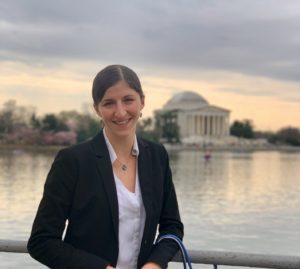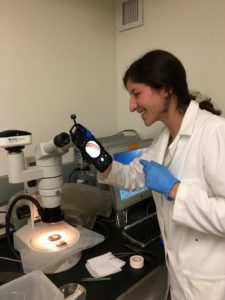July 2, 2020
AGU welcomes 2020-2021 Congressional Science Fellow, Dr. Anja Malawi Brandon
Posted by Emily Orzechowski
AGU is pleased to announce its 43rd Congressional Science Fellow, Dr. Anja Malawi Brandon. Each year, AGU sponsors highly accomplished earth and planetary scientists to serve in the U.S. Congress as advisors on pressing science and technology policy issues. As a sponsored fellow, Anja will participate in the American Association for the Advancement of Science’s prestigious Science and Technology Policy fellowship program and serve a one-year term in a congressional office.
Dr. Anja Malawi Brandon’s interest in science took root growing up along the shores of the Puget Sound and has since flourished into an accomplished career at the intersection of scientific research and solutions to one of our society’s most pressing environmental issues: the problem of plastic pollution. We sat down with Anja (virtually) to learn more about her cutting-edge research and science policy interests.
How did you first get interested in science?
“I always liked going outside and being in nature, coming from Seattle, WA – that meant a lot of time spent on the coast. I was fascinated by all the marine animals I saw while tide-pooling and eventually started volunteering at the Seattle Aquarium. It was there that I first started learning more about marine science and biology and started falling in love with science. It was also there where I first started learning about the vast problems facing our marine environment and decided to do something about one issue that I constantly encountered in my coastal explorations: plastic pollution.”
Can you describe your research on plastic pollution for us?
“I study ways to break down plastics using natural systems (insects and microorganisms) as a cost-effective, sustainable alternative to landfilling and recycling. Specifically, I am researching how mealworms and their gut microorganisms can break down plastics like polystyrene (think packing peanuts) and polyethylene (think shopping bags). My goal is to understand how these organisms break down plastics so that we can use this process to better manage plastic waste, with the ultimate goals being to prevent plastics from entering the environment as pollution in the first place and to develop ways to break down the current plastic pollution in the environment.”
What led you to pursue AGU’s Congressional Science Fellowship and science policy in general?
“I became an environmental engineer to help find solutions to major environmental problems, especially problems facing the oceans. I’ve learned that given the scale of environmental issues, simply designing technical solutions is not sufficient to create meaningful change. History has shown that new science-based solutions are most impactful when they are coupled with changing policy and enforcing new regulations. I realized that working in science policy would be a perfect way to use my science and engineering perspective to implement changes, which is why I was so drawn to the AGU Fellowship.”
What excites you most about serving as an AGU Congressional Science Fellow?
“I am excited to learn how science and scientists can meaningfully impact legislation and what makes for successful science advocacy. I cannot think of a more unique time to be entering the world of science policy and I am excited to use my voice in DC to address any number of the growing challenges facing our country and our planet. I am specifically interested in working on policies to protect our marine environment, especially as we enter the UN Decade of Ocean Science!”
We hope you’ll join us in welcoming Anja to her new role at the intersection of science and society. Stay tuned for updates as Anja’s fellowship progresses!
Apply for the 2021-2022 Congressional Science Fellowship
To learn more about applying for an AGU Congressional Science Fellowship, visit the AGU Science Policy website. Applications for the 2021-2022 term will be open 15 October 2020 – 15 January 2021.




